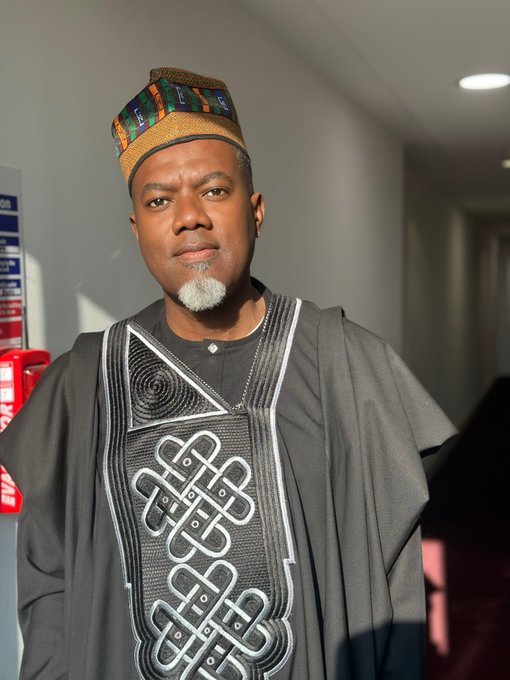In a scathing attack on Nasir el-Rufai, former Governor of Kaduna State, Reno Omokri, a former aide to former President Goodluck Jonathan, has denounced the politician’s recent remarks suggesting the possibility of a military coup in Nigeria. Reno has strongly criticized the ex-governor, accusing him of treasonous behavior and irresponsibility for his comments, which he described as dangerous and self-serving.
El-Rufai, in a speech made earlier this week, spoke out against the current administration, making comparisons between the government of President Bola Ahmed Tinubu and military rule. He stated, “For those of us who lived half our lives under military rule, we know what it is. We don’t want a military rule, but we also don’t want civilians behaving like the military in their babbar riga and suits.”
El-Rufai’s statement drew sharp rebuke from Omokri, who argued that the comments were not only reckless but also potentially destabilizing to Nigeria’s democracy. “It is utterly irresponsible for any politician to bait the military into taking over simply because they lost out in this administration,” Omokri said, adding that such remarks were nothing short of treasonous, especially considering el-Rufai’s own controversial record while in office.
Omokri pointed out that during el-Rufai’s tenure as governor, the Kaduna state government was accused of demolishing the homes of critics, and many, including prominent figures like Audu Maikori, were jailed or forced into exile. “This man was a danger to democracy while he held sway in Kaduna. He used his power to silence dissent, arrest and exile critics, and presided over a reign marked by violence,” Omokri stated. “Now, he has the audacity to call for a military takeover because he lost out on a ministerial position.”
Additionally, Omokri reminded Nigerians of the darker chapters of el-Rufai’s governance. “El-Rufai admitted to paying herdsmen, a practice which many believe helped fuel the widespread killings in Southern Kaduna. Under his leadership, violence became routine in the region,” Omokri said. “Now he has the nerve to compare this government to military rule?”
El-Rufai’s actions as a politician have come under renewed scrutiny as Omokri recalled several key moments from the past. El-Rufai had been a vocal critic of General Muhammadu Buhari’s candidacy before aligning with him and joining the ranks of his political supporters. “This is the same man who once labeled Buhari as unelectable. He was publicly critical of the General and even referred to his military record as a cautionary tale. Yet, after a meeting with President Jonathan, he reversed course and became a prominent voice in Buhari’s campaign,” Omokri pointed out.
The political climate surrounding el-Rufai has become particularly tense after his failure to secure a ministerial appointment in President Tinubu’s administration, following his outspoken criticism of the current government. Omokri suggested that these recent remarks may be driven by his frustration over his political losses.
“It’s clear to me and to many Nigerians that el-Rufai’s actions are motivated by personal bitterness,” Omokri said. “He didn’t get the ministerial post he was hoping for, and now he’s using the specter of military rule as a tool to destabilize the political landscape.”
While el-Rufai’s comments about military rule have stirred controversy, Omokri’s comments have sparked an even broader debate on Nigeria’s democratic health. “We must be vigilant,” Omokri urged, “and remind Nigerians of the kind of leader el-Rufai truly is—a man who, when denied power, is quick to call for undemocratic measures to regain influence.”
It wasn’t just his military coup talk that drew attention but also his alliances and shifting political allegiances. El-Rufai’s meeting with opposition figures, including those affiliated with Peter Obi, has raised eyebrows. On the same day that el-Rufai was seen with these figures, Peter Obi, a former presidential candidate, issued a statement distancing himself from power-hungry coalitions. Obi declared, “I am not interested in any coalition that is for the purpose of taking power,” highlighting the growing rift between those seeking to capture the state and those advocating for genuine reform.
Omokri also referenced the behind-the-scenes machinations of Nigerian politics, recounting a key moment in 2010 when el-Rufai, after meeting with then-President Jonathan, began pushing for the presidency, hoping to secure the vice president role. When Jonathan chose Namadi Sambo instead, el-Rufai shifted his allegiance and began attacking the same government he had once supported. “This is the same Nasir el-Rufai who once sought Jonathan’s favor but turned against him when his ambitions were thwarted,” Omokri observed.
Reno Omokri concluded his remarks with a stern warning to the Nigerian public: “It is time we hold Nasir el-Rufai accountable for his actions. His comments about a military takeover are not just irresponsible—they are dangerous. The Nigerian people must stand firm in defense of our democracy. We will not allow anyone to sabotage our hard-earned democratic progress, especially someone with such a questionable track record.”

